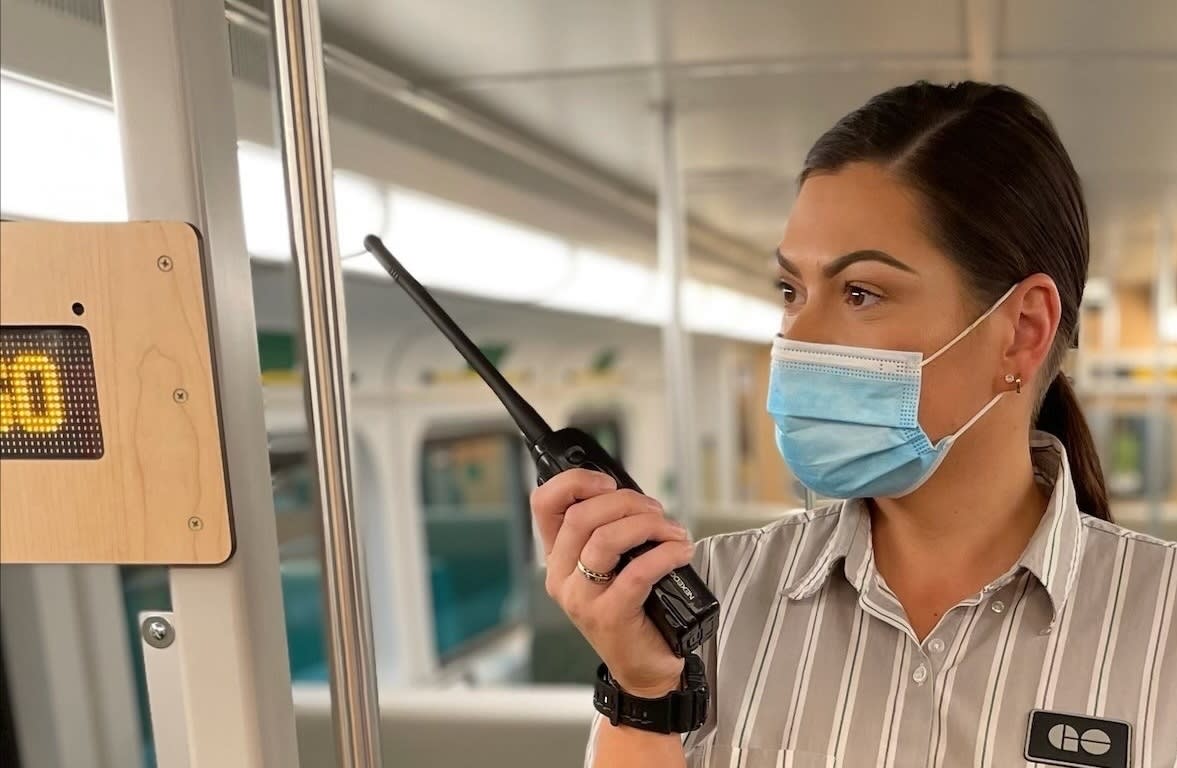GO Customer Service Ambassador rushes to help revive passenger
This story of life and death is a reminder of the importance of having first aid training on the GO.
Nov 23, 2021
GO train Customer Service Ambassador Keri Merrimen was closing the doors and giving her signal to depart Union Station.
It was supposed to be just another quiet journey for those onboard.
Then the alarm sounded.
GO train customer service ambassador, Keri Merrimen, is shown – thanks to a self-timed photo taken on her phone – at her station inside the accessibility coach. (Keri Merrimen photo)
It was activated a few coaches away from her, on a Lakeshore West Line train, in late October.
A man in his 50s, had a possible heart attack.
Merrimen, who works in the accessibility coach, was alerted that she was needed. Within seconds, her adrenaline kicked in. She grabbed an automated external defibrillator (AED) and sprinted four coaches down to attend to a man lying unconscious on the floor.
A witness said the man was stumbling and clutching his chest before falling to the ground.
One eye-witness customer, who is a nurse, recalls that she and another GO rider, a doctor, initially came to the man’s aid, performing CPR.
Merriman then arrived on the scene.
“In that initial first moment when you realize that you’re about to tend to a real emergency, you take a deep breath and then in an instant it registers, and your training kicks in,” says Merrimen, who’s worked on GO trains for four years.
Checking that there was no skull injury from the fall, Merrimen tilted the man’s head back looking for signs of breath or throat obstructions. She continued to get information from passengers around him.
The customer recalls that after they performed chest compressions, Merrimen attached the AED and performed the first shock.
Saving his life was a team effort, she says.
Not The First Time
Many employees will go through their entire career not experiencing an emergency like this.
“But I’ve had it happen twice,” Merrimen explains.
In May 2019, she had a similar incident happen at Union Station. It was also a heart attack – and it was also tough.
The customer had his wife beside him, and she was pleading with Merrimen and her crewmate to save her husband.
“It was extremely emotional,” Merrimen says. “We applied the defibrillator and performed CPR on him until EMS arrived – but he never regained consciousness.”
"“I remember thinking to myself ‘Not this time, he isn’t going to die, this man is going to live.’”"- GO Transit CSA, Keri Merrimen
Unfortunately, that man later died, and the fatality left a lasting impression on Merrimen. She thought about it during this recent emergency.
“I remembered exactly how the defibrillator was to be applied, how to do the compressions – it all ran through my mind like I was on autopilot,” says Merrimen.
“I remember thinking to myself ‘Not this time, he isn’t going to die, this man is going to live.’”
Merrimen felt determined and focused – and that this time around, the outcome would be different.
After an additional 30 compressions, the man’s eyelids opened briefly, and Merrimen felt a faint pulse. Within a few minutes, EMS arrived on scene and took over.
“Sir, do you know where you are?” they asked him when he was finally able to talk.
He answered back: “I’m on a GO train supposed to be going to Aldershot, but I guess that’s not happening.”
Overcome with emotion that the man was now speaking, Merrimen cried, while laughing at his reply.
The train crew members – who worked as a team with customers in the effort to comfort and tend to the man – looked at each other in disbelief.
For Merrimen, it still seems surreal and feels like a miracle. She credits the outcome to the training she has received – while adding, first aid training should be a priority for everyone.
“When the passenger alarm (the yellow strip in the coaches) is activated, CSAs respond without hesitation,” explains Bilal Quadri, the manager of Customer Service at Alstom, the rail company that staffs and runs GO trains.
“CSAs are the first responders on GO Trains.”
GO train Customer Service Ambassador Keri Merrimen offloads a ramp on a GO train. (Keri Merrimen photo)
He was impressed with Merrimen’s reaction and ability to revive someone showing no vital signs, while also helping to manage a crowd of anxious observers.
For Merrimen, words can’t describe the feeling of helping to save a man’s life, especially knowing the outcome could have been very different.
The experience has shown her that life is fragile, and that everyone should prepare to perform CPR and first aid.
She says: “You never know when someone could need it and I hope that anyone who is ever faced with any sort of emergency has trust in their capabilities and finds the courage to take action.”
So every shift, Merrimen boards another GO train to watch over customers taking trips they assume will be quiet and uneventful voyages.
(Editor’s note – This story was edited shortly after publication to include details from an eye-witness who reached out to help the man involved.)
by Nitish Bissonauth Metrolinx bilingual editorial content advisor
